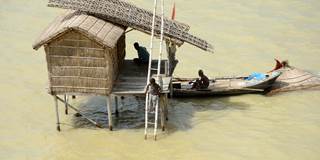Something has gone badly wrong in the emerging economies that were supposed to shape the world's future. Although falling commodity prices, fracking, US interest rates, and other factors have been blamed for these countries' woes, the real culprit is poor policymaking, owing to weak political institutions.
LONDON – Something has gone badly wrong in the emerging economies that were supposed to be shaping, even dominating, the future of the world. The search for culprits is under way: commodity prices, fracking, US interest rates, El Nino, China, these and others lead the field. But the answer is simpler and more traditional. It is politics.
Look at Brazil. There an economy once tipped for ever-lasting boom has barely grown for more than two years, and is currently shrinking. Falling prices for its commodity exports haven’t helped, but Brazil’s economy was supposed to be about far more than just harvests and extractive industries.
Or look at Indonesia. That economy is still expanding, but at a rate – 4.7% annually in the latest quarter – that is disappointing in terms both of previous expectations and of population growth. The same can be said of Turkey, where growth has sagged to 2.3% in the latest quarter – which at least beats population growth but is meager compared with the country’s go-go years of 2010 and 2011, when it expanded by 9%. Or South Africa, where economic progress has constantly been too slow, whether in boom years for gold and other resources or busts, to make any real dent in poverty levels.

LONDON – Something has gone badly wrong in the emerging economies that were supposed to be shaping, even dominating, the future of the world. The search for culprits is under way: commodity prices, fracking, US interest rates, El Nino, China, these and others lead the field. But the answer is simpler and more traditional. It is politics.
Look at Brazil. There an economy once tipped for ever-lasting boom has barely grown for more than two years, and is currently shrinking. Falling prices for its commodity exports haven’t helped, but Brazil’s economy was supposed to be about far more than just harvests and extractive industries.
Or look at Indonesia. That economy is still expanding, but at a rate – 4.7% annually in the latest quarter – that is disappointing in terms both of previous expectations and of population growth. The same can be said of Turkey, where growth has sagged to 2.3% in the latest quarter – which at least beats population growth but is meager compared with the country’s go-go years of 2010 and 2011, when it expanded by 9%. Or South Africa, where economic progress has constantly been too slow, whether in boom years for gold and other resources or busts, to make any real dent in poverty levels.